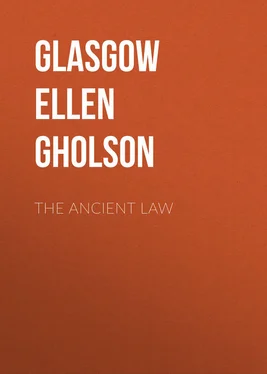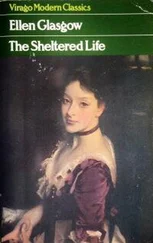Ellen Glasgow - The Ancient Law
Здесь есть возможность читать онлайн «Ellen Glasgow - The Ancient Law» — ознакомительный отрывок электронной книги совершенно бесплатно, а после прочтения отрывка купить полную версию. В некоторых случаях можно слушать аудио, скачать через торрент в формате fb2 и присутствует краткое содержание. Жанр: foreign_antique, foreign_prose, на английском языке. Описание произведения, (предисловие) а так же отзывы посетителей доступны на портале библиотеки ЛибКат.
- Название:The Ancient Law
- Автор:
- Жанр:
- Год:неизвестен
- ISBN:нет данных
- Рейтинг книги:3 / 5. Голосов: 1
-
Избранное:Добавить в избранное
- Отзывы:
-
Ваша оценка:
- 60
- 1
- 2
- 3
- 4
- 5
The Ancient Law: краткое содержание, описание и аннотация
Предлагаем к чтению аннотацию, описание, краткое содержание или предисловие (зависит от того, что написал сам автор книги «The Ancient Law»). Если вы не нашли необходимую информацию о книге — напишите в комментариях, мы постараемся отыскать её.
The Ancient Law — читать онлайн ознакомительный отрывок
Ниже представлен текст книги, разбитый по страницам. Система сохранения места последней прочитанной страницы, позволяет с удобством читать онлайн бесплатно книгу «The Ancient Law», без необходимости каждый раз заново искать на чём Вы остановились. Поставьте закладку, и сможете в любой момент перейти на страницу, на которой закончили чтение.
Интервал:
Закладка:
"My head was very painful and he talked so rapidly I could hardly follow him," he replied; "but is it possible, Emily, that you have been digging in the garden?"
"There is nobody else to do it," replied Emily, with an impatient flash in her eyes; "only half the garden has been spaded. If you disapprove so heartily, I wish you'd produce someone to do the work."
Mrs. Brooke, who had produced nothing in her life except nine children, six of whom had died in infancy, offered at this a feeble and resigned rebuke.
"I am sure you could get Salem," she replied.
"We owe him already three months' wages," returned the girl, "I am still paying him for last autumn."
"All I ask of you, Emily, is peace," remarked Beverly, in a gentle voice, as he prepared to enter the house. "Nothing – no amount of brilliant argument can take the place of peace in a family circle. My poor head is almost distracted when you raise your voice."
The three children flocked out of the dining-room and came, with a rush, to fling themselves upon him. They adored him – and there was a live terrapin which they had brought in a box for him to see! In an instant his depression vanished, and he went off, his beautiful face beaming with animation, while the children clung rapturously to his corduroy coat.
"Amelia," said Emily, lowering her voice, "don't you think it would improve Beverly's health if he were to try working for an hour every day in the garden?"
Mrs. Brooke appeared troubled by the suggestion. "If he could only make up his mind to it, I've no doubt it would," she answered, "he has had no exercise since he was obliged to give up his horse. Walking he has always felt to be ungentlemanly."
She spoke in a softly tolerant voice, though she herself drudged day and night in her anxious, tearful, and perfectly ineffectual manner. For twenty years she had toiled patiently without, so far as one could perceive, achieving a single definite result – for by some unfortunate accident of temperament, she was doomed to do badly whatever she undertook to do at all. Yet her intention was so admirable that she appeared forever apologising in her heart for the incompetence of her hands.
Emily placed the spade in the corner of the porch, and desisting from her purpose, went upstairs to wash her hands before going in to dinner. As she ascended the wide, dimly lighted staircase, upon which the sun shone with a greenish light from the gallery above, she stopped twice to wonder why Beverly's visitor had slept in the barn like a tramp only six weeks ago. Before her mirror, a minute later, she put the same question to herself while she braided her hair.
The room was large, cool, high-ceiled, with a great brick fireplace, and windows which looked out on the garden, where purple and white lilacs were blooming beside the gate. On the southern side the ivy had grown through the slats of the old green shutters, until they were held back, crumbling, against the house, and in the space between one of the cedars brushed always, with a whispering sound, against the discoloured panes. In Emily's absence a curious melancholy descended on the old mahogany furniture, the greenish windows and the fireless hearth; but with the opening of the door and the entrance of her vivid youth, there appeared also a light and gracious atmosphere in her surroundings. She remembered the day upon which she had returned after ten years' absence, and how as she opened the closed shutters, the gloom of the place had resisted the passage of the sunshine, retreating stubbornly from the ceiling to the black old furniture and then across the uncarpeted floor to the hall where it still held control. For months after her return it had seemed to her that the fight was between her spirit and the spirit of the past – between hope and melancholy, between growth and decay. The burden of debt, of poverty, of hopeless impotence had fallen upon her shoulders, and she had struggled under it with impetuous gusts of anger, but with an energy that never faltered. To keep the children fed and clothed, to work the poor farm as far as she was able, to stay clear of any further debts, and to pay off the yearly mortgage with her small income, these were the things which had filled her thoughts and absorbed the gallant fervour of her youth. Her salary at the public school had seemed to Beverly, though he disapproved of her position, to represent the possibility of luxury; and in some loose, vague way he was never able to understand why the same amount could not be made to serve in several opposite directions at the same time.
"That fifty dollars will come in very well, indeed, my dear," he would remark, with cheerfulness, gloating over the unfamiliar sight of the bank notes, "it's exactly the amount of Wilson's bill which he's been sending in for the last year, and he refuses to furnish any groceries until the account is settled. Then there's the roof which must be repaired – it will help us there – then we must all have a supply of shoes, and the wages of the hands are due to-morrow, I overlooked that item."
"But if you pay it all to Wilson," Emily would ask, as a kind of elementary lesson in arithmetic, "how is the money going to buy all the other things?"
"Ah, to be sure," Beverly would respond, as if struck by the lucidity of the idea, "that is the question."
And it was likely to remain the question until the end of Beverly – for he had grown so accustomed to the weight of poverty upon his shoulders that he would probably have felt a sense of loss if it had been suddenly removed. But it was impossible to live in the house with him, to receive his confidences and meet his charming smile and not to entertain a sentiment of affection for him in one's heart. His unfailing courtesy was his defence, though even this at times worked in Emily an unreasonable resentment. He had ruined his family, and she felt that she could have forgiven him more easily if he had ruined it with a less irreproachable demeanour.
After her question he had said nothing further about the tobacco, but a chance meeting with Adam Whaley, as she rode into Tappahannock on the Sunday after Ordway's visit, made clear to her exactly what the purpose of that visit had been.
"It's a pity Mr. Beverly let his tobacco spoil, particular' arter his wheat turned out to be no account," remarked Adam. "I hope you don't mind my sayin', Miss Em'ly, that Mr. Beverly is about as po' a farmer as he is a first rate gentleman."
"Oh, no, I don't mind in the least, Adam," said Emily. "Do you know," she asked presently, "any hands that I can get to work the garden this week?"
Whaley shook his head. "They get better paid at the factories," he answered; "an' them that ain't got thar little patch to labour in, usually manage to git a job in town."
Emily was on her old horse – an animal discarded by Mr. Beverly on account of age – and she looked down at his hanging neck with a feeling that was almost one of hopelessness. Beverly, who had never paid his bills, had seldom paid his servants; and of the old slave generation that would work for its master for a song, there were only Micah and poor half-demented Aunt Mehitable now left.
"The trouble with Mr. Beverly," continued Adam, laying his hand on the neck of the old horse, "is that he was born loose-fingered jest as some folks are born loose-moraled. He's never held on to anything sense he came into the world an' I doubt if he ever will. Why, bless yo' life, even as a leetle boy he never could git a good grip on his fishin' line. It was always a-slidin' an' slippin' into the water."
They had reached Tappahannock in the midst of Adam's philosophic reflection; and as they were about to pass an open field on the edge of the town, Emily pointed to a little crowd which had gathered in the centre of the grass-grown space.
"Is it a Sunday frolic, do you suppose?" she inquired.
Читать дальшеИнтервал:
Закладка:
Похожие книги на «The Ancient Law»
Представляем Вашему вниманию похожие книги на «The Ancient Law» списком для выбора. Мы отобрали схожую по названию и смыслу литературу в надежде предоставить читателям больше вариантов отыскать новые, интересные, ещё непрочитанные произведения.
Обсуждение, отзывы о книге «The Ancient Law» и просто собственные мнения читателей. Оставьте ваши комментарии, напишите, что Вы думаете о произведении, его смысле или главных героях. Укажите что конкретно понравилось, а что нет, и почему Вы так считаете.












